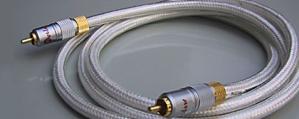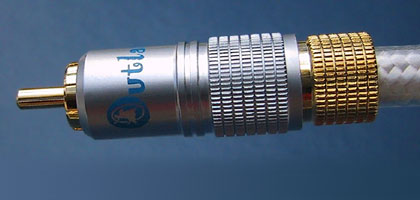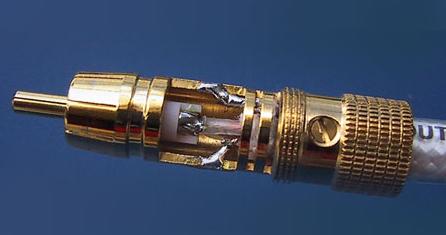|
|

|
|
Specifications:
● 6N Copper (99.9998%
Oxygen-Free)
● Dual
Shielded
● Threaded
RCA Lock-down
● MSRP: $49.95 for One 1.2 Meter Pair; $159.95
for Four Pairs
Outlaw Audio
www.outlawaudio.com | |
Introduction
There have been several Internet companies over the past years that have
really broken the mold in terms of price performance. They use the
internet to bypass the normal marketing monster that increases prices with
its mega marketing campaigns and dealer markups. Some of the most notable
in this area are Bettercables.com, SV Subwoofers, and Outlaw Audio. All
three of these companies have brought outstanding product and value to
their respective markets and allow consumers to purchase a far higher
level of product for their dollar.
Recently I had the opportunity to review a new amplifier that Outlaw is
offering, the 7100. There was one dilemma though. My current setup uses
XLR interconnects between my processor and amplifier. Since this has been
the case for sometime now, I didnít have any analog RCA cables for
interconnects. Then I found out something that I donít think most people
are aware of, Outlaw makes cables too. So I requested a set to use during
the 7100 review. They gladly shipped me out a set of their PCA (Pure
Copper Analog) cables.
The Design
Outlaw has their cables manufactured using a patented process
of cooling the copper after it has been heated and poured. This process
reduces the fragmentation of the copper to near zero. Their PCA
interconnects use copper that approaches 6N (99.9998% oxygen-free).
There are many debates on the advantages of copper compared to silver as a
conductor for audio purposes. It is true that silver is a better conductor
but there are VERY few companies that use pure silver for their cable
runs. They usually just coat their copper with silver instead. Outlaw
offers some pure silver cables as well, but they are a tad more expensive.
When the cables arrived, I was immediately impressed with their
construction. The cables are double jacketed and slightly bigger then most
designer cables. Outlaw employs separately jacketed conductor paths for
their offerings as well as dual shielding. This is supposed to eliminate
unwanted noise from RFI and EMI as well as other electrical sources.
The terminations are also a standout. Instead of using
typical RCA plugs, they have opted for a tightening screw-type terminator.
This is an RCA plug that has a threaded sleeve that tightens down on it. I
found this option to be a much more solid connection then I am accustomed
to with RCA style cables and more in line with XLR offerings in terms of
sturdiness.


There is a downside to this approach though. Most receivers and processors
have very little room in between the connectors. Because of the sleeve
tightening down, it may be hard for some to get these connectors on or off
due to space considerations. But I assure you, once they are on, they arenít
coming off unless you want them to.
The Listening
Once I connected the amplifier to my processor using the PCA
interconnects, I was very pleased with the results. No, my soundstage
didnít change drastically, but I wasnít expecting it to. The noise floor
didnít shift at all audibly, which is nice considering I was using
balanced cables before. The Outlaw cables didnít intrude, and they offered what
seemed like a seamless path audibly. This is what I expect from a boutique
cable. These factors, coupled with outstanding build quality, are the reasons one considers a
higher end interconnect in the first place.
Conclusions
At the end of my time with reviewing the Outlaw amplifier, I decided to purchase the
Outlaw cables
they had provided. I was extremely pleased with the connectors and their rugged
design. I now use them in my system for multi-channel analog audio. I
donít think I can give any product a higher recommendation then buying it
myself. I look forward to future cable offerings from Outlaw, as they have
outstanding performance at a excellent price point, just like their
amplifiers.
- Kris Deering -
Terms and Conditions of Use

|






